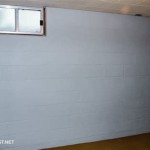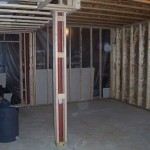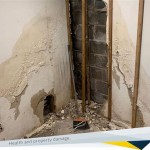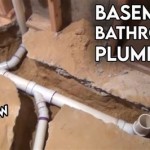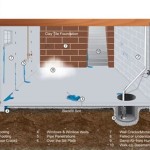Why Is My Basement Floor Cracking?
Cracks in a basement floor are a common concern for homeowners. While some cracks are superficial and pose no structural threat, others can indicate serious underlying issues. Understanding the various causes of basement floor cracks allows homeowners to assess the severity of the problem and take appropriate action.
One of the most prevalent causes of basement floor cracking is shrinkage. Concrete, like many other materials, shrinks as it cures. This shrinkage can create tensile stress within the concrete slab, leading to cracks. These cracks often appear as hairline fractures and typically occur within the first few years after the concrete is poured. Control joints are often incorporated into the concrete during construction to manage this shrinkage, but sometimes cracks still occur.
Settlement is another significant contributor to basement floor cracks. The soil beneath a house can shift and settle over time due to various factors, including changes in moisture content, freeze-thaw cycles, and the decomposition of organic matter. This uneven settlement can exert pressure on the foundation and basement floor, causing it to crack. These cracks are often wider than shrinkage cracks and may appear in a variety of patterns, including diagonal, horizontal, or vertical lines.
Hydrostatic pressure can also contribute to basement floor cracking. This pressure is exerted by groundwater against the foundation walls and floor. When the pressure becomes excessive, it can cause the concrete to crack and even bow inwards. This is a serious issue that requires professional attention to address the underlying water problem and repair the structural damage.
Heaving, the opposite of settlement, can also lead to cracks. Heaving occurs when the soil beneath the foundation expands, often due to excessive moisture or frost. This upward pressure can cause the basement floor to crack and lift, potentially damaging the structure of the home. Addressing heaving requires managing the underlying moisture issue, which could involve improving drainage around the foundation.
The quality of the concrete mix itself can influence the likelihood of cracking. A mix with too much water can weaken the concrete, making it more susceptible to cracking. Similarly, insufficient curing time can prevent the concrete from achieving its full strength, increasing the risk of cracks. Using a properly designed concrete mix and ensuring adequate curing time are crucial for preventing future problems.
Tree roots can exert significant pressure on foundations and basement floors. As trees grow, their roots can extend beneath the house, seeking moisture and nutrients. These roots can exert enough force to cause the concrete to crack and even displace sections of the floor. Addressing this issue may involve removing the offending trees or installing root barriers.
Overloading the basement floor can also contribute to cracking. Placing exceptionally heavy objects or equipment directly on the floor can exceed its load-bearing capacity, causing it to crack. Distributing weight evenly and avoiding excessive loads can help prevent this type of damage.
Improper backfilling during construction can create voids around the foundation. Over time, these voids can collapse, causing the soil to settle and the basement floor to crack. Careful and proper backfilling techniques are essential to ensure a stable foundation.
The type of soil beneath the house also plays a role in the likelihood of cracking. Expansive soils, such as clay, are particularly prone to shrinking and swelling with changes in moisture content. This constant movement can put significant stress on the foundation and basement floor, increasing the risk of cracks. Understanding the soil type and its properties is important for mitigating potential problems.
Temperature fluctuations can also affect the basement floor. Concrete expands and contracts with temperature changes. While concrete is designed to withstand these fluctuations, extreme temperature swings can contribute to cracking, especially in combination with other factors like settlement or hydrostatic pressure.
The presence of pre-existing cracks in the foundation walls can sometimes transfer stress to the basement floor, resulting in new cracks in the floor. Addressing these foundation wall cracks is crucial to prevent further damage to the basement floor.
Identifying the cause of basement floor cracks requires careful observation and, in some cases, professional expertise. Factors like the width and pattern of the cracks, the age of the house, and the surrounding environment can provide valuable clues. A structural engineer can assess the situation and recommend appropriate solutions.
Repairing basement floor cracks depends on the underlying cause and the severity of the damage. Minor shrinkage cracks can often be filled with epoxy or other concrete repair products. However, more serious cracks resulting from settlement or hydrostatic pressure may require more extensive repairs, including underpinning or drainage solutions. Consulting with a qualified professional is recommended for any significant crack.

Causes Of Basement Floor Cracks And What To Do About Them News Events For Systems Inc

Cracks In Basement Floor Signs Of Foundation Problems

Are Cracks In My Basement Floor Normal The Real Seal Llc

Why Are Cracks In My Basement Floor Mt Drains Plumbing

Large Concrete Cracks In Basement Structural Engineering General Discussion Eng Tips

What Causes Leaky Floors In Basements Fixing Leaking Basement

Why Is There A Crack In My Basement Floor

Home Faq What Is Causing Cracks In My Basement Floor Why This Bad

Large Concrete Cracks In Basement Structural Engineering General Discussion Eng Tips

Are Cracks In New Build Concrete Floors Normal Inspections

